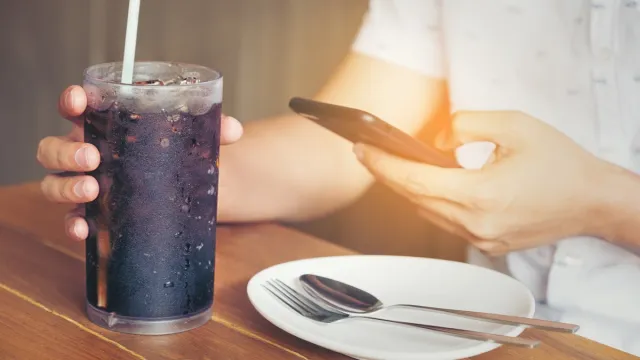Diet Soda Fans, Take Caution: New Study Finds Serious Heart Condition Risk

Sodas, juices, and other beverages can contain an alarming amount of sugar and calories, which is why so many of us reach for diet options. These drinks typically advertise minimal or even zero calories and sugar—making us feel like we’re going with the health-conscious choice. But, in reality, artificially sweetened drinks can be even more detrimental to your health than sugar-sweetened options—and research shows they can even spike your risk of a serious heart condition.
RELATED: New Study Warns Vitamin B3 Supplements Could Spike Heart Disease Risk.
A new study published on March 5 in Circulation: Arrhythmia and Electrophysiology looked into sugar-sweetened and artificially sweetened beverages’ association with a heart condition called atrial fibrillation (AFib). Mayo Clinic describes AFib as an “irregular and often very rapid heart rhythm,” which can lead to blood clots in the heart and also increase the risk of stroke, heart failure, and other complications.
For the latest study, researchers used health data from over 200,000 adults enrolled in the UK Biobank. After 10 years of following participants, study authors found that people who drank two liters (roughly five and a half 12-ounce cans) or more of artificially sweetened drinks every week were 20 percent more likely to develop AFib than those who drank smaller amounts.
But while this data might be disconcerting, it doesn’t mean you should switch back to sugar-sweetened beverages. According to an American Heart Association (AHA) press release outlining findings, researchers found that people who drank two liters of sugar-sweetened drinks had a 10 percent increased risk of AFib.
RELATED: Doctor Calls Out These 4 Unhealthy Diet Trends You Should Always Avoid.
In the press release, Penny M. Kris-Etherton, PhD, RD, FAHA, emeritus professor of nutritional sciences at Penn State University and AHA nutrition committee member, highlighted the fact that this is the first study to link both no- and low-calorie sweeteners and sugar-sweetened drinks to AFib.
“While there is robust evidence about the adverse effects of sugar-sweetened beverages and cardiovascular disease risk, there is less evidence about adverse health consequences of artificial sweeteners,” Kris-Etherton said in the release.
(Another study published in The American Journal of Clinical Nutrition this month found that just two sugar-sweetened beverages each week can increase the risk of cardiovascular disease, regardless of physical activity.)
When analyzing participant data, researchers highlighted additional health concerns. Those who drank more artificially sweetened drinks were more likely to be female, younger, and have a higher body mass index (BMI). There was also a higher incidence of type 2 diabetes among this group. Conversely, participants who drank more sugar-sweetened beverages were more likely to be younger, male, and have a lower socioeconomic status and higher BMI. Those who drank more sugar-sweetened had a higher prevalence of heart disease as well.
Lead study author Ningjian Wang, MD, PhD, a researcher at the Shanghai Ninth People’s Hospital and Shanghai Jiao Tong University School of Medicine in Shanghai, China, noted that findings “cannot definitively conclude that one beverage poses more health risk than another” due to diet complexity.
RELATED: 8 Ways Women Can Slash Their Heart Disease Risk, FDA Says in New Update.
As an observational study, findings also can’t confirm that these drinks directly cause AFib—even though the association remained when accounting for participants’ genetic susceptibility to the condition. However, you should still rethink the amount of sweetened beverages you consume, whether it’s made with real or artificial sugar, researchers say.
“Based on these findings, we recommend that people reduce or even avoid artificially sweetened and sugar-sweetened beverages whenever possible,” Wang said in the release. “Do not take it for granted that drinking low-sugar and low-calorie artificially sweetened beverages is healthy, it may pose potential health risks.”
Kris-Etherton noted that more research is needed on this topic, but for the time being “water is the best choice.”
When you want to satisfy your craving for a sweet beverage, you may want to consider a glass of pure, unsweetened fruit juice. According to study data, those who drank one liter (about 34 ounces) or less of these juices weekly had an 8 percent lower risk of AFib.
“Based on this study, no- and low-calorie sweetened beverages should be limited or avoided,” Kris-Etherton concluded.
Best Life offers the most up-to-date information from top experts, new research, and health agencies, but our content is not meant to be a substitute for professional guidance. When it comes to the medication you’re taking or any other health questions you have, always consult your healthcare provider directly.
- Source: Circulation: Arrhythmia and Electrophysiology: Sweetened Beverages, Genetic Susceptibility, and Incident Atrial Fibrillation: A Prospective Cohort Study
- Source: Mayo Clinic: Atrial fibrillation
- Source: The American Journal of Clinical Nutrition: Sugar-sweetened or artificially-sweetened beverage consumption, physical activity, and risk of cardiovascular disease in adults: a prospective cohort study